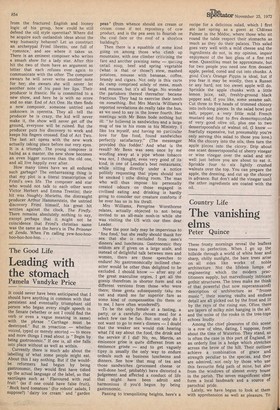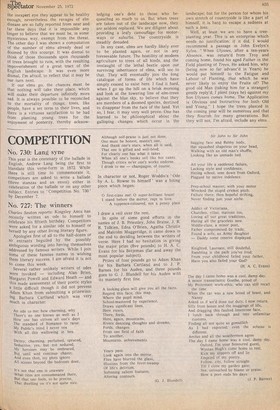Country Life
The vanishing elms
Peter Quince
These frosty mornings reveal the leafless trees to perfection. When I go up the hillside through a world of white hoar and sharp, chilly sunlight, the bare trees arise on all sides like works of noble architecture. Not the lifeless lumps of engineering which the mod,ern practitioners supply, but marvellously intricate gothic structures. The trees make me think of that powerful (but now superannuated) description of architecture as "frozen music ", their soaring vaults and endless detail are all picked out by the frost and lit by the rays of the rising sun. Often there are layers of milky mist hanging in the air, and the noise of the rooks in the tree-tops echoes loudly. Among the chief pleasures of this scene is a row of elms, dating, I suppose, from about the time of Waterloo. They stand, as is often the case in this part of England, in an orderly line in a hedge which stretches across the brow of the hill. Their outlines achieve a combination of grace and strength peculiar to the species, and they are admired, not only by those who use this favourite field path of mine, but also from the windows of almost every house in the parish. The seven magnificent elms form a local landmark and a source of parochial pride.
Lately, we have begun to look at them with apprehension as well as pleasure. To the inexpert eye they appear to be healthy enough; nevertheless the ravages of elm disease are so fully reported from near and far these days that it is impossible any longer to believe that we must be, in some mysterious way, exempt from the threat. The other day I was shown a computation of the number of elms already dead or doomed by -this scourge. It was dismal to think of those thousands upon thousands of trees brought to ruin, with the resulting impoverishment of a great tract of the English landscape. It was even more dismal, I'm afraid, to reflect that it may be our turn next.
If our elms go, the chances must be that nothing will take their place, which Will make their departure infinitely more sad, It is always possible to be reconciled to the mortality of things; trees, like People, have a set term to their lives, and there is a virtuous satisfaction to be had from planting young trees for the enjoyment of posterity, thereby acknow ledging one's debt to those who bequeathed so much to us. But when trees are taken out of the landscape now, they are seldom replaced. We are diligent about providing a leafy camouflage for motorways or suburbs. The countryside is steadily denuded.
In any case, elms are hardly likely ever to be planted again, or not in any foreseeable future. The hostility of modern agriculture to trees of all kinds, and the onslaught of the lethal beetle upon our surviving inheritance of elms, will see to that. They will eventually join the long catalogue of forms of life which have simply ceased to exist here. I find it hard, when I go up the hill on a brisk morning and look at the towering line of elm-trees against the blue sky, to believe that they are members of a doomed species, destined to disappear from the face of the land. Yet so, I fear, it may very well prove. One has learned to be philosophical about the galloping changes which occur in the landscape; but for the person for whom his own stretch of countryside is like a part of himself, it is hard to escape a sadness at such a loss.
Well, at least we are to have a treeplanting year. This is an enterprise which needs no justification: if it did, I would recommend a passage in John Evelyn's SyIva. "When Ulysses, after a ten-years Absence, was return'd from Troy and coming home, found his aged Father in the Field planting of Trees, He asked him, why (being now so far advanc'd in Years) he would put himself to the Fatigue and Labour of Planting, that which he was never likely to enjoy the Fruits of? The good old Man (taking him for a stranger) gently reply'd; I plant (says he) against my Son Ulysses comes home. The Application is Obvious and Instructive for both Old and Young." I hope the trees planted in the coming year will be numerous and that they flourish for many generations. But they will not, I'm afraid, include any elms.













































 Previous page
Previous page